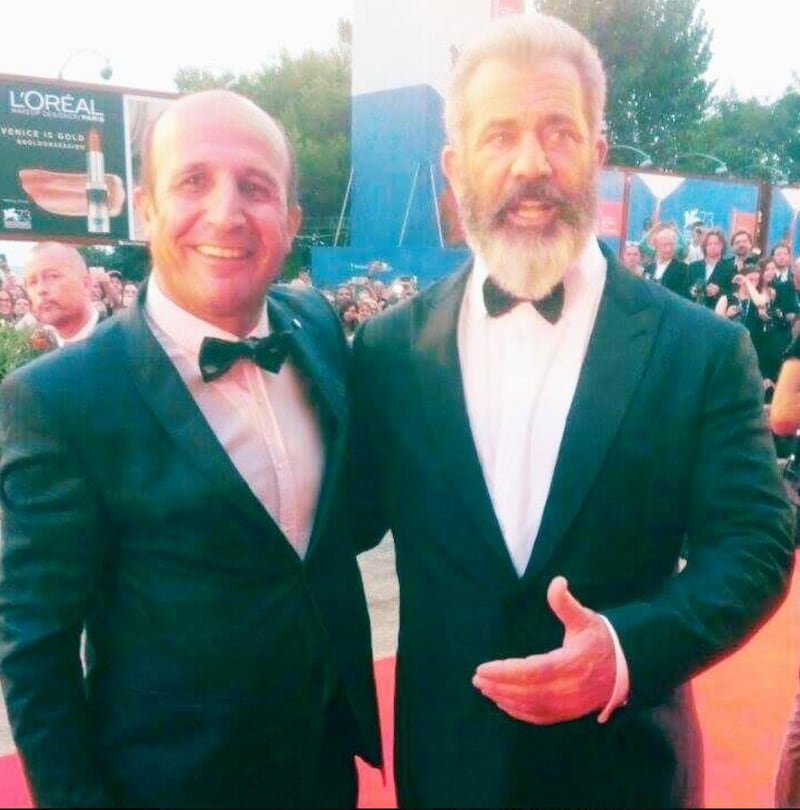Omer Sarikaya is a director. He is a philanthropist. He has connections with A-listers in Turkey and in Hollywood. At least, that is the life the 50-year-old from Turkey has carefully created for public consumption, using opportunistic social media posts and media interviews.
A picture of him with Mel Gibson at the Venice Film Festival is used to announce a new film they're working on together and an accompanying interview with Sarikaya in The Irish Sun waxes lyrical about Gibson's enthusiasm for the project, despite featuring no quotes from the actor himself.
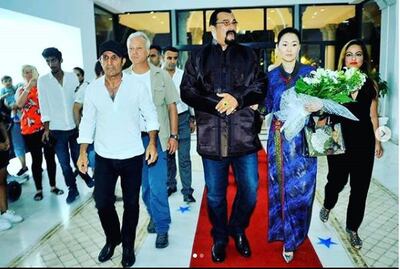
Pictures of Sarikaya and 1990s action star Steve Seagal walking out of an airport in Bodrum are seen across Sarikaya's social media channels, as he announces Seagal as his latest collaborator, to help bring the story of tragic Syrian toddler Alan Kurdi to cinema screens.
Except neither Gibson nor Seagal have ever been involved in any of Sarikaya's films. As far as the actors' agents are concerned, the pictures were circumstantial; a fan meeting their idol. They've asked Sarikaya to stop associating the images with any of his projects.
Sarikaya's latest film, Islamo-Phobia, has 1990s action star Jean-Claude Van Damme front and centre on the movie poster. His involvement in the project has been trumpeted in articles published across the world. Except Van Damme himself calls this "fake news".
"This director must have fallen down and hit his head," Van Damme tells The National. "I'm busy for the next five years, so I'm not doing a movie with a Turkish director. This guy is talking about me and Steven Seagal and maybe tomorrow he will be talking about the King of Thailand. Who knows? So, fake news."
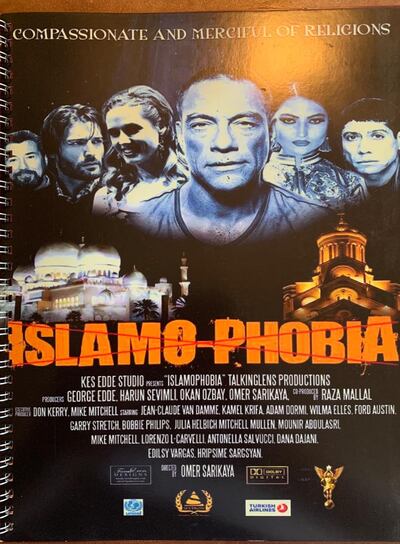
Leonardo DiCaprio, Colin Farrell, Saoirse Ronan and plenty more have also appeared in articles about coming Sarikaya projects. Yet they've also failed to materialise in the supposed films themselves.
If you were to consider his IMDb profile, Sarikaya has a long and varied background in film – with about a dozen movies under his belt.
He claims to have made films that had their premieres at the Cannes Film Festival. His latest project, Aylan Baby, is allegedly set to tell the story of Kurdi, the Syrian toddler who became a symbol of Europe's migration crisis in 2015 after images showed his lifeless body washed up on a Turkish beach. Many of Sarikaya's production crews and actors work for free, on the understanding that all proceeds from the films are going to charity.
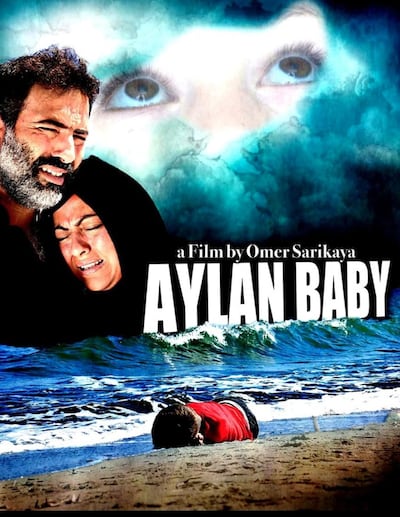
It's the same story he has told several media outlets, and possible collaborators, for years. His IMDb account would certainly attest to that: a smiling Sarikaya in a black tie, surrounded by cameras, on a film festival red carpet. Under that image is a series of directing, producing and writing credits; a respectable career in the film industry?
Well, not quite. Because the charities Sarikaya claims to be working with have never received money from his movies, while one is even publicly distancing itself from him. Many of his "projects" have been in production for years, or are "finished" films that have never been released.
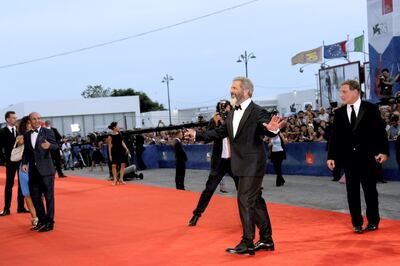
The National has spent several months reaching out to and interviewing dozens of cast and crew who have been involved in Sarikaya's films, and some who have never heard of him, despite their names appearing on cast lists.
"It became very, very clear to everybody that this was a sham," Hollywood producer Matt Taylor says of his involvement in Islamo-Phobia.
Chapter One: Working with Leonardo DiCaprio, Saorise Ronan and James Cameron?
Sarikaya was born and raised in Batman, a small city of about 350,000 in the south-eastern Anatolia region of Turkey. It's unclear how he spent the first four decades of his life, as his fledgling IMDb profile seems only to have surfaced in 2011, with executive producer credits on small-scale Turkish projects and one acting credit in a short film.
But it wasn't until 2012 that the charm offensive took off, when he started drumming up support for his first big film project, Famine.
If you were to believe the articles at the time, Famine seemed to be quite the project.
In April 2012, Sarikaya told the Drogheda Independent and the Hurriyet Daily News that Irish director Mark Mahon would helm the romance film set amid the Great Irish Potato Famine, and none other than Leonardo DiCaprio and Colin Farrell had been linked to roles.
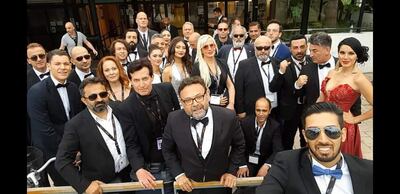
But then, several months later, in an interview with NTV, Sarikaya said the film would be made by Titanic director James Cameron.
So why was Mahon ousted from the job so abruptly? A representative for Mahon said Sarikaya had indeed approached them, but “he was never officially attached”.
"Mark terminated all communications with him to protect his own credibility after Mr Sarikaya officially published stories about Colin Farrell and Leonardo DiCaprio being linked to his project, which he was advised by Mark at the time that he could not do."
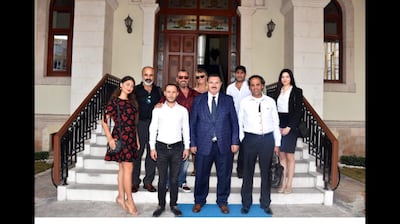
By July, Sean Bean and Saorise Ronan's names had been proffered in interviews given by Sarikaya. Around this time, Irish would-be filmmaker Aidan Whelan was contacted by Sarikaya to consider an executive producer role for Famine. Sarikaya had initially told Whelan the project had support from Screen Ireland, Ireland's film board, and was being co-produced with a recognised Irish production company. Sarikaya said that all profits from the film would go to charity.
"After an initial review of the project, it was clear there was no film board support," Whelan says. "Upon further review regarding the project's Unicef connection, this was an untrue statement as there was no proof of representation from Unicef. What was said about this project's status was a lie
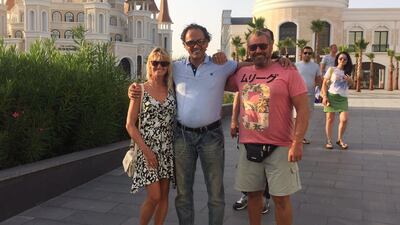
A 27-page proposal for the film, obtained by The National, outlines Famine's budget as €500,000 to €750,000 (Dh2 million to Dh3m), with an estimated worldwide gross of $190 million (Dh697.8m).
Branding for Unicef was used in the proposal, alongside several other charities, including the Food and Agriculture Organisation of the UN, the World Health Organisation and the International Federation of Red Cross and Red Crescent Societies.
Scottish actor Mike Mitchell, whose acting credits include Gladiator and the James Bond film Skyfall, was also to star.
Chapter Two: Cast and crew go without pay, and false charity claims
When his role in Famine fell through, Mitchell says Sarikaya later got in touch to offer him a role in Islamo-Phobia. He was told none of the cast or crew would receive payment and all profits would go to charity.
Names such as Van Damme, Daniel Baldwin and Chris Mulkey were bandied around and plastered on promotional material. The shoot got off to a rocky start.
"I did see many crew upset as they had been promised payment of some kind, I saw more than one heated argument … I did find it hard to believe that some of the A-listers whose names were being bandied around would work for free," Mitchell says.
“My feeling was, I had agreed to work free and as long as I believed everyone was in the same boat I would go along with it.”
Working on the film turned out to be "very hard work to say the least". "It turned out not to be low budget but no budget, I had to improvise and write my own words in any scene I played in," he says.
And the big names never turned up, either. They were always "arriving tomorrow".
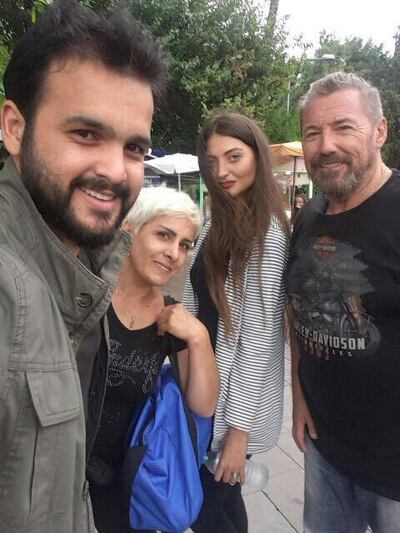
Other actors and crew contacted by The National had similar experiences.
Spanish actor Jesus Sans, who most recently played Mahatma Gandhi in Murder of Gandhi, met Sarikaya by chance at the European Film Market in Berlin last year, after turning down a role in Famine.
Sarikaya asked to take a selfie with him and Sans obliged.
"A friend called me and told me to check Facebook," Sans says. "Omer had posted the picture saying I had confirmed to come on as executive producer of Islamo-Phobia. But we never even talked about that."
In a surprise twist, Sans says he eventually relented to being part of the film as the charitable cause was appealing to him.
The shoot was a disaster, he says. "Omer was not qualified but he was able to convince people. I was paying for things for him, trying to support him," he says. "Paying five times for hotels, giving him money – one time I gave him money for his teeth. He wanted to go to the dentist but said he had no money."
And then there are those who were never involved to begin with. Italian actress Isabelle Adriani was listed on the website for Islamo-Phobia. Her representative said she was never approached, nor involved. "We tried to erase Isabelle's name from websites, but it didn't always work."
Peruvian actress Mariann Gavelo is listed on Famine's IMDb page. Her agent said Sarikaya "attached one of my clients to a film I knew nothing of".
A representative for English actor and former boxer Gary Stretch, who was listed on the IMDb profile for Famine, also said he was unaware of the project. "I don't know who he is and he has never spoken to me or my client's agent."
Chapter Three: Two film owners with no knowledge of one another
It was May 2017 when Sarikaya approached Istanbul businessman Harun Sevimli to invest in the Islamo-Phobia project. Sevimli was asked to come on board as an executive producer and pour $50,000 to $100,000 into the project. That figure quickly ballooned.
"He was throwing names all over the place – Mel Gibson and Robert De Niro and who knows who else," Sevimli says.
"He said 'I just need money'. I asked for collateral and what I was getting out of it. He said I'll get all the rights, 50 per cent of the profits, and executive producer credits."
Sevimli says he bought the naming rights to the movie and invested TRY200,000 (Dh127,824) in about August 2017. Images provided by Sevimli show him, Sarikaya and some of the cast and crew meeting at government offices in Antalya. Other photos show cast and crew pre-shoot, smiling and relaxed. Van Damme and Baldwin are nowhere to be seen.
"He didn't have any money, not even bus or taxi money," Sevimli says. "He said the prince of Dubai was going to fly in. He lied. He thinks all the money will come from Dubai."
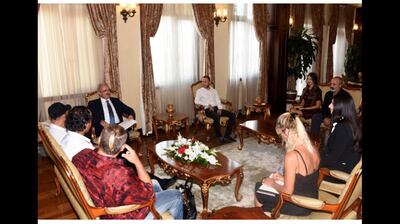
Sevimli was in Antalya for three weeks as he says Sarikaya "scrambled" to get the film off the ground. Eight days of shooting took place. But Sevimli was mortified at the quality of what was being made.
"Then I said enough was enough, I took the masters and we asked him to let it go and he will still get the credit," he says. "But let someone with experience finish it. He didn't listen."
Sevimli packed up and left soon afterwards. "I said if my name is affiliated with it ever again I will sue."
He recounts several instances in which crew were promised salaries but were never paid: a make-up artist from Italy who had worked with Cirque du Soleil, an elderly man who served as head of photography.
"The make-up artist came to me crying because she needed a flight home. I paid it," Sevimli says. "Omer had told everyone I was a billionaire or something and that I would pay everything."
Sevimli has since tried to launch legal action against Sarikaya.
"He ruined my life. This guy really ruined my brain. How could he play with these people's lives?"
But Sarikaya had already moved on to Germany and found another investor. Aliekber Yildiz, owner of the country's Star Academy, also claims to be the owner of Islamo-Phobia and says he signed a contract with Sarikaya last year.
He says he paid about €280,000 to produce the film – €150,000 for the rights, €60,000 in sponsorship, more than €40,000 in post-production costs and €30,000 to clear Sarikaya's personal debts.
Neither Yildiz, nor Sevimli, were aware of each other until The National spoke to them.
When The National spoke to Sarikaya about the two supposed owners, he said they were both "lying". He said the reason the shoot moved from Turkey to Germany was that they had "some problems with sponsorship" and a "visa crisis" with Baldwin, and "some other B and C-list actors couldn't come".
But Sarikaya says neither Sevimli nor Star Academy now own the film. That right belongs to a Turkish businessman named Zeki Bayirli, who also purchased the rights last year. Bayirli said it was his first foray into the film industry; until then, he had been a hotel and supermarket owner.
Chapter Four: 'this isn’t Avengers: Endgame. This was brutal'
The final step in Islamo-Phobia's filming process seems to have taken place in the United States. That was when Matt Taylor and Erik Spurgin met Sarikaya.
Taylor represents Japanese actress Ikumi Yoshimatsu, who Sarikaya had sought out for numerous roles.
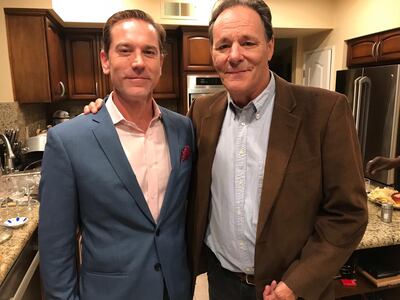
"He started calling, inquiring about her being in a film project in 2013," Taylor says. "Over the years he would call to tell me he had Mel Gibson and Daniel Baldwin and all these big sponsors. He said the profits would go to Unicef and the UN was going to sponsor stuff.
We thought ‘wow, here’s an ambitious director from Turkey wanting to go against the tide of Islamophobia’, so it was something we wanted to support.
"A year ago he showed up saying he had finished Islamo-Phobia and that he wanted to shoot a few scenes with Chris Mulkey. He said he had an investor in Dubai and [another producer] was financing everything."
Taylor, who once represented Seagal, admits that Sarikaya had them all "hook, line and sinker".
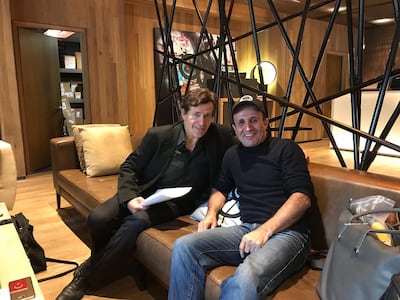
Spurgin had seen the advertisement for the film on IMDb and reached out to Sarikaya to "express interest". "We had a quick phone call and I thought it was worth a bit of investigation. The level of investment was relatively low. He needed help to get to LA to film some pick-up shots," Spurgin says.
In terms of investment, Spurgin says he gave about $10,000, but did not pay Sarikaya directly, instead offering to cover things such as accommodation for the director and his entourage.
"He arrived without a credit card," Spurgin says. "Then he was waxing poetic about his vision of what we were going to do, but … I was asking him all these questions and he had no answers."
Things came crashing down when Spurgin and Taylor went to film pick-up shots with Sarikaya at a mansion outside LA.
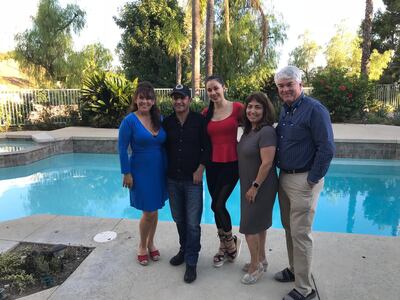
“Omer was supposed to be directing but I quickly discovered he had absolutely no clue and didn’t have even the basic understanding of photography or shooting or anything else. It became very, very clear to everybody that this was a sham,” Taylor says.
"We then backed him into a corner and asked him to show us Islamo-Phobia. We sat in a room watching this grossly difficult to watch mix of random scenes. We had all been played. The investor immediately checked out of the hotel and left."
Spurgin felt similarly about the film. "It's 150 minutes – and this isn't Avengers: Endgame. This was brutal," he says. "The cinematography was bad, the acting was bad, the lighting was bad, the writing was bad.
I confronted Omer in the lobby of the hotel. We said we can’t endorse this film at all. There’s no way to save it.
"
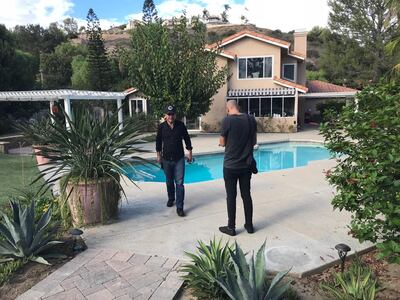
Mulkey later sent him a cease and desist letter, asking him to stop using his name in association with the film.
Taylor says Sarikaya departed the next day, leaving about $10,000 in unpaid bills. "Hollywood has sifted through most of its problems in the last few years," Taylor says. "But this type of individual … I've never seen anything like it.
He's a conman. It's so brazen, almost like Catch Me If You Can."
Spurgin is still listed on Islamo-Phobia's IMDb page and on the movie poster, despite repeatedly asking Sarikaya to be removed.
The film has never been released, despite it initially being listed as such on IMDb. The film was changed to "pre-production" on the site on July 2 this year, after The National contacted Sarikaya.
Sarikaya has widely claimed the film had its premiere at the Cannes Film Festival. However, that's not exactly true. A representative for Cannes said the film screened as part of the Marche du Film, an industry event at Cannes where producers pay to put on screenings of films they are trying to sell to distributors across the world. Anyone can show films at the market.
When contacted a second time to clear up these chronologies, Sarikaya said it was all simply "a misunderstanding" and the film had never been released.
Chapter Five: Non-existent charities and one that does exist, but wants no part of this
When we asked Sarikaya which charity would receive the profits from Aylan Baby, he said "100 per cent Unicef". He insisted he told the children's fund about his intentions and that it was "very happy with that".
But Unicef has warned Sarikaya against claiming to be affiliated with the fund. A representative for the organisation said: "Unicef does not permit any use of our name, brand and logo, as well as fund-raising on our behalf, without permission.
"Our records indicate that the individual concerned had reached out to the Turkish National Committee for Unicef twice to initiate a fund-raising partnership and was clearly informed by the Committee that he was not permitted to use Unicef's name and logo in relation to the promotion of the film."
And despite the fact he's referred to "The International Red Cross and Red Crescent" in marketing material and interviews for Famine, it seems they would be unknowing recipients of the film's profits, too. Mostly because The International Red Cross and Red Crescent doesn't exist. There are, however, Red Cross and Red Crescent societies, as well as the International Federation of Red Cross and Red Crescent Societies.
Representatives of the charities told us that Sarikaya was not believed to have been in touch with them, nor was there a fund-raising agreement in place with either charity. The UNHCR, the UN refugee agency, also said they were unaware of the director.
Chapter Six: How to promote a film, using Mel Gibson and one very circumstantial photo
Late last year, Sarikaya tried to get Famine off the ground again. He did so with a photo of him and Gibson, arms around each other, on the red carpet at the Venice Film Festival in 2016. To the uninitiated, it could indeed look the work of two people who had just signed up to work together, as Sarikaya claimed it to be in an interview with The Irish Sun.
"Mel thinks the topic of the story is amazing," he said. "He loves Irish people and the country"
But in reality, things were quite different.
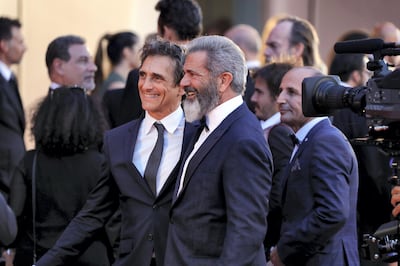
Movie producer Gina Destito ran into Sarikaya at Venice that year.
"He had two tickets to Hacksaw Ridge and took me along. Mel Gibson was there promoting it. He saw Mel Gibson on the red carpet and got a photo with him."
That image then formed the foundation of Sarikaya's story of a burgeoning working relationship with the action star.
When The National contacted Gibson's publicist, Alan Nierob, he said he had never heard of Sarikaya, and that neither he nor Gibson were ever attached to the project. "I don't know anything about it," Nierob said.
Sarikaya suggested we might have spoken to the wrong agent. "I spoke with Mel Gibson, I met him at the Venice Film Festival and he liked the idea. He wanted to be in it. There are thousands of people in LA, thousands think they are Mel Gibson's agent."
Sarikaya's latest film, Aylan Baby, has been promoted similarly. Sarikaya has shared pictures on social media of both him and Seagal in Turkey and international news articles trumpeted Seagal's involvement.
But Seagal's representative, Dan Delts, says the actor was in Istanbul for humanitarian purposes and has no plans to make any movie in Turkey, nor a movie with Sarikaya and "absolutely no movie regarding Aylan Baby now or in the future".
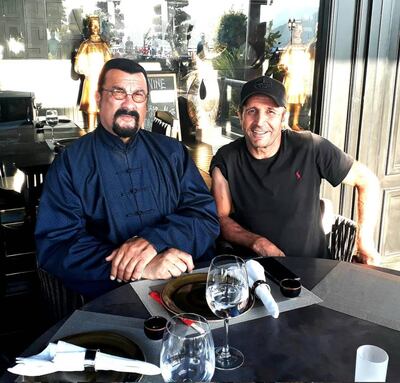
"Steven was invited to Turkey by other associates and as is clearly obvious in those pictures, Steven was surrounded by multiple people. Omer was with the welcoming party, but that is where his relationship with Seagal ends," Delts says.
However, Aylan Baby's producer, George Edde, claims to have been in Dubai this year with Seagal drumming up support.
Edde later told The National he was with Seagal in Dubai "two days ago" for "humanitarian purposes" related to the film.
Questions sent to Daniel Baldwin were seemingly forwarded to Sarikaya from Baldwin himself.
Chapter Seven: What is 'Aylan Baby'?
Which brings us back to Aylan Baby. Scottish actor Mitchell was initially on set for the film this year, having been promised scenes with Seagal.
"Again no money, as all profits were going to charity," Mitchell says. "But it became clear I didn't have a role within the script and the scene I shot had no meaning to me whatsoever. Where is Seagal [I asked]? He said he is coming tomorrow … so, much to Omer's surprise, we just left."
When asked about the premise of Aylan Baby, Sarikaya initially told The National that the movie was not about Kurdi, but was about stories of refugees from "around the world". He said the name "Aylan" was simply a generic name.
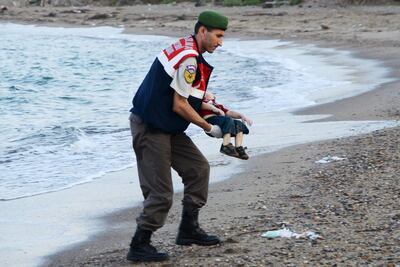
However, the one-minute long trailer for Aylan Baby uses the heartbreaking footage of Kurdi's body, face down on a beach, which in 2015 sparked a deep emotional reaction in Europe. An accompanying caption reads: "Three years ago on 2 September 2015, three-year-old Aylan Baby drowned crossing the Aegean Sea along with his five-year-old brother and mother."
The trailer ends with an enlarged picture of Kurdi's lifeless body, superimposed over a picture of a meeting of the UN.
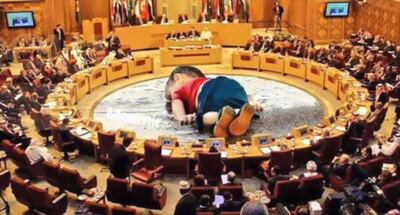
When news of the film broke in late June, family members sharply denounced it. Tima Kurdi, an aunt of Alan Kurdi, told the CBC network it was "unacceptable".
Sarikaya was unperturbed, telling us Tima Kurdi’s comments were “strange”, and that he was now good friends with Alan’s father. This was a “total misunderstanding”, he said.
When asked where the profits from this film would go, he said: "Just for humanitarian aid", but could not name a charity. Instead, he said: "This film is going to be twice as impactful as Titanic."
It might seem like a bold call, but Sarikaya has used this line to promote several of his his films over the years.
In fact, he likened Famine to Titanic in 2012 in the Drogheda Independent, and again six days later in The Hurriyet Daily News, in 2015 with the Irish Post, and the same month in Aramco World.
"
When asked why he made movies for seemingly no release and no profit, he said: "It's my job, it's my way and it's my things... everybody's happy with that, everybody loves me."
The National has obtained a copy of Islamo-Phobia. Van Damme does not appear in the movie. Nor does Mulkey. It's a tough two-and-a-half-hour watch.
When asked whether he was proud of the film, Sarikaya was adamant that he was. He said it simply needed to have 10 minutes cut from it so it could meet industry regulations.
Sarikaya then sums up his work in a few short sentences. "I am a shepherd," he says. "I look after the sheep. I didn't study or anything. Everyone who teaches me – I don't listen. I do things my way."
